大学教育的目标The Goal of University Education
- 格式:doc
- 大小:27.00 KB
- 文档页数:3
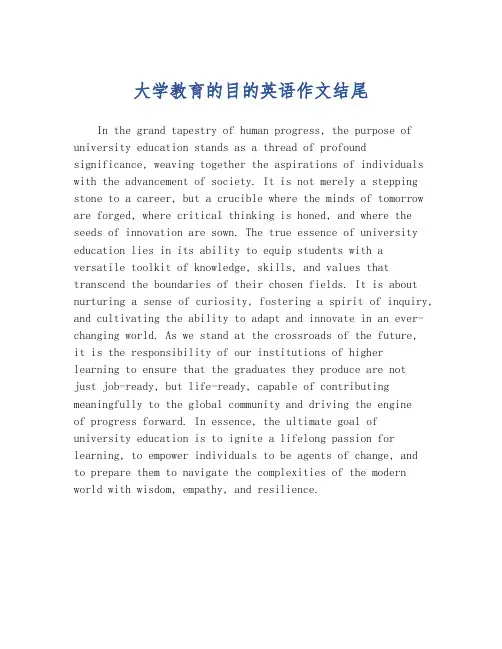
大学教育的目的英语作文结尾In the grand tapestry of human progress, the purpose of university education stands as a thread of profound significance, weaving together the aspirations of individuals with the advancement of society. It is not merely a stepping stone to a career, but a crucible where the minds of tomorrow are forged, where critical thinking is honed, and where the seeds of innovation are sown. The true essence of university education lies in its ability to equip students with aversatile toolkit of knowledge, skills, and values that transcend the boundaries of their chosen fields. It is about nurturing a sense of curiosity, fostering a spirit of inquiry, and cultivating the ability to adapt and innovate in an ever-changing world. As we stand at the crossroads of the future,it is the responsibility of our institutions of higherlearning to ensure that the graduates they produce are notjust job-ready, but life-ready, capable of contributing meaningfully to the global community and driving the engineof progress forward. In essence, the ultimate goal ofuniversity education is to ignite a lifelong passion for learning, to empower individuals to be agents of change, andto prepare them to navigate the complexities of the modern world with wisdom, empathy, and resilience.。
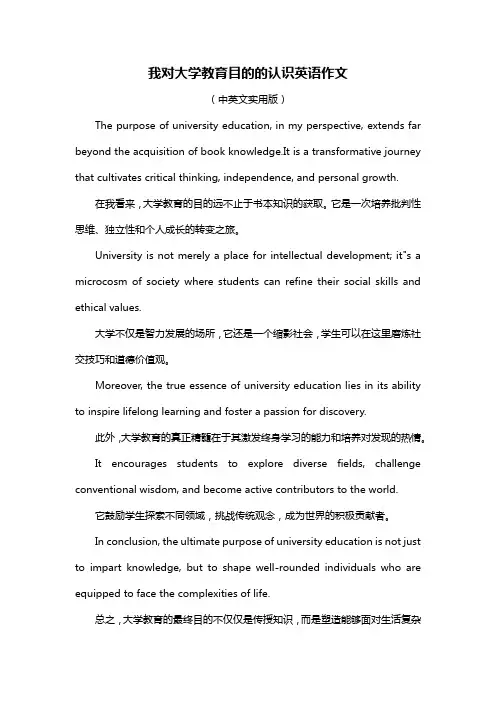
我对大学教育目的的认识英语作文(中英文实用版)The purpose of university education, in my perspective, extends far beyond the acquisition of book knowledge.It is a transformative journey that cultivates critical thinking, independence, and personal growth.在我看来,大学教育的目的远不止于书本知识的获取。
它是一次培养批判性思维、独立性和个人成长的转变之旅。
University is not merely a place for intellectual development; it"s a microcosm of society where students can refine their social skills and ethical values.大学不仅是智力发展的场所,它还是一个缩影社会,学生可以在这里磨炼社交技巧和道德价值观。
Moreover, the true essence of university education lies in its ability to inspire lifelong learning and foster a passion for discovery.此外,大学教育的真正精髓在于其激发终身学习的能力和培养对发现的热情。
It encourages students to explore diverse fields, challenge conventional wisdom, and become active contributors to the world.它鼓励学生探索不同领域,挑战传统观念,成为世界的积极贡献者。
In conclusion, the ultimate purpose of university education is not just to impart knowledge, but to shape well-rounded individuals who are equipped to face the complexities of life.总之,大学教育的最终目的不仅仅是传授知识,而是塑造能够面对生活复杂性的全面发展的个体。
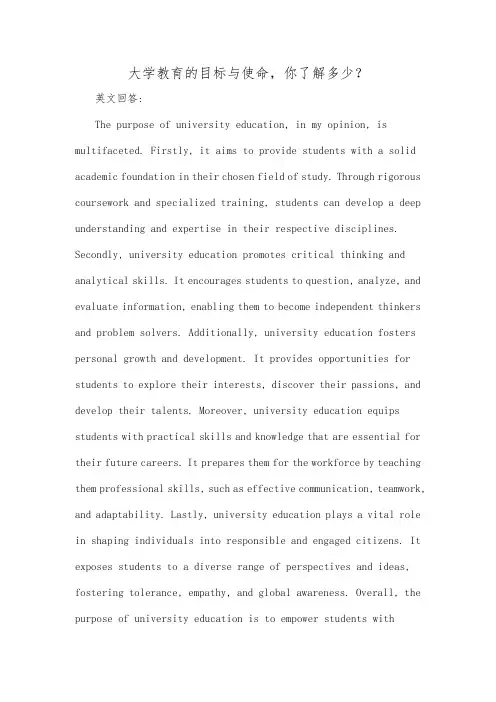
大学教育的目标与使命,你了解多少?英文回答:The purpose of university education, in my opinion, is multifaceted. Firstly, it aims to provide students with a solid academic foundation in their chosen field of study. Through rigorous coursework and specialized training, students can develop a deep understanding and expertise in their respective disciplines. Secondly, university education promotes critical thinking and analytical skills. It encourages students to question, analyze, and evaluate information, enabling them to become independent thinkers and problem solvers. Additionally, university education fosters personal growth and development. It provides opportunities for students to explore their interests, discover their passions, and develop their talents. Moreover, university education equips students with practical skills and knowledge that are essential for their future careers. It prepares them for the workforce by teaching them professional skills, such as effective communication, teamwork, and adaptability. Lastly, university education plays a vital role in shaping individuals into responsible and engaged citizens. It exposes students to a diverse range of perspectives and ideas, fostering tolerance, empathy, and global awareness. Overall, the purpose of university education is to empower students withknowledge, skills, and values that will enable them to succeed academically, professionally, and personally.中文回答:我认为大学教育的目的是多方面的。
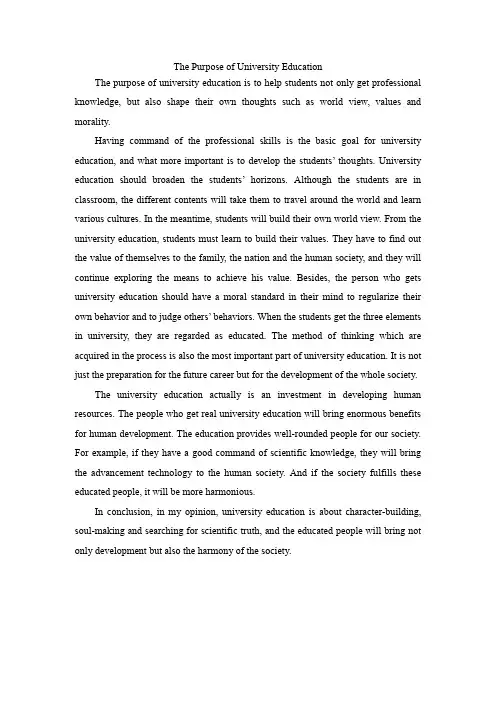
The Purpose of University EducationThe purpose of university education is to help students not only get professional knowledge, but also shape their own thoughts such as world view, values and morality.Having command of the professional skills is the basic goal for university education, and what more important is to develop the students’ thoughts. University education should broaden the students’horizons. Although the students are in classroom, the different contents will take them to travel around the world and learn various cultures. In the meantime, students will build their own world view. From the university education, students must learn to build their values. They have to find out the value of themselves to the family, the nation and the human society, and they will continue exploring the means to achieve his value. Besides, the person who gets university education should have a moral standard in their mind to regularize their own behavior and to judge others’ behaviors. When the students get the three elements in university, they are regarded as educated. The method of thinking which are acquired in the process is also the most important part of university education. It is not just the preparation for the future career but for the development of the whole society.The university education actually is an investment in developing human resources. The people who get real university education will bring enormous benefits for human development. The education provides well-rounded people for our society. For example, if they have a good command of scientific knowledge, they will bring the advancement technology to the human society. And if the society fulfills these educated people, it will be more harmonious.In conclusion, in my opinion, university education is about character-building, soul-making and searching for scientific truth, and the educated people will bring not only development but also the harmony of the society.。
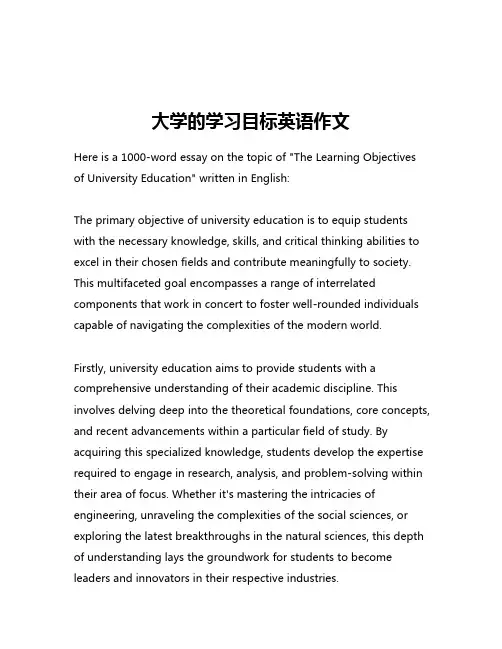
大学的学习目标英语作文Here is a 1000-word essay on the topic of "The Learning Objectives of University Education" written in English:The primary objective of university education is to equip students with the necessary knowledge, skills, and critical thinking abilities to excel in their chosen fields and contribute meaningfully to society. This multifaceted goal encompasses a range of interrelated components that work in concert to foster well-rounded individuals capable of navigating the complexities of the modern world.Firstly, university education aims to provide students with a comprehensive understanding of their academic discipline. This involves delving deep into the theoretical foundations, core concepts, and recent advancements within a particular field of study. By acquiring this specialized knowledge, students develop the expertise required to engage in research, analysis, and problem-solving within their area of focus. Whether it's mastering the intricacies of engineering, unraveling the complexities of the social sciences, or exploring the latest breakthroughs in the natural sciences, this depth of understanding lays the groundwork for students to become leaders and innovators in their respective industries.Alongside the pursuit of disciplinary knowledge, university education also emphasizes the development of critical thinking and analytical skills. Students are challenged to question assumptions, examine multiple perspectives, and engage in rigorous reasoning to reach well-informed conclusions. This process of critical inquiry fosters the ability to think independently, identify and evaluate complex problems, and devise innovative solutions. These skills are not confined to a single field of study but are applicable across a wide range of professional and personal contexts, empowering students to navigate the ever-changing landscape of the 21st century.Another key objective of university education is to nurture effective communication skills. In today's interconnected world, the ability to articulate ideas clearly, persuasively, and empathetically is paramount. University curricula often include courses and workshops focused on honing written, oral, and interpersonal communication abilities. Students learn to craft compelling arguments, engage in constructive dialogue, and adapt their communication styles to diverse audiences. These skills are essential not only for academic success but also for professional advancement and personal fulfillment.Furthermore, university education aims to cultivate a sense of social responsibility and global citizenship. Through coursework,community engagement, and extracurricular activities, students develop an understanding of the complex social, political, and environmental issues facing the world. They learn to appreciate diverse perspectives, recognize their role as active members of local and global communities, and commit to making positive contributions. This holistic approach encourages students to consider the broader implications of their actions and to become agents of change, committed to addressing societal challenges and promoting the greater good.Equally important, university education fosters the personal growth and well-being of students. The university experience provides a supportive environment for individuals to explore their interests, discover their passions, and develop a sense of self-awareness and self-confidence. Through counseling services, wellness programs, and opportunities for self-reflection, students are empowered to cultivate a healthy work-life balance, manage stress, and maintain their mental and physical well-being. This emphasis on personal development equips students with the resilience and adaptability needed to navigate the complexities of life beyond the university walls.Finally, a key objective of university education is to prepare students for successful careers and lifelong learning. By offering a diverse range of academic programs, internships, and career counselingservices, universities enable students to acquire the skills and experiences necessary to thrive in their chosen professions. Moreover, the critical thinking and problem-solving abilities developed during the university experience instill in students a passion for continuous learning and adaptation. This fosters a mindset of adaptability and lifelong growth, ensuring that graduates are equipped to navigate the ever-evolving demands of the job market and contribute to the knowledge economy throughout their careers.In conclusion, the learning objectives of university education encompass a multifaceted set of goals designed to foster well-rounded, socially responsible, and intellectually curious individuals. From acquiring disciplinary expertise and critical thinking skills to developing effective communication abilities and a sense of global citizenship, the university experience prepares students to thrive in their personal and professional lives. By prioritizing this holistic approach to education, universities play a vital role in shaping the leaders, innovators, and engaged citizens of tomorrow.。
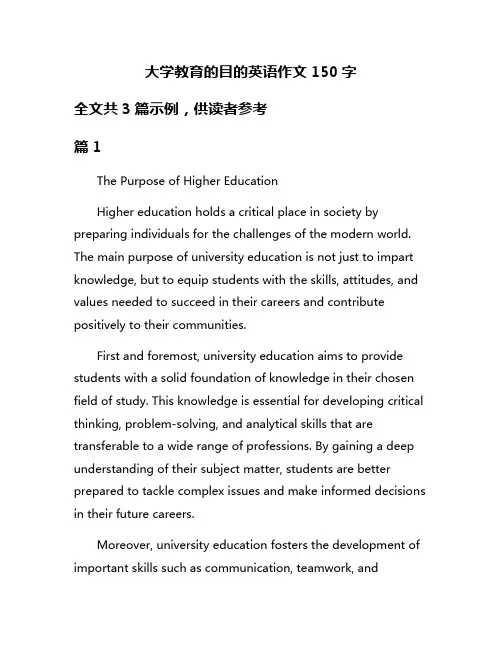
大学教育的目的英语作文150字全文共3篇示例,供读者参考篇1The Purpose of Higher EducationHigher education holds a critical place in society by preparing individuals for the challenges of the modern world. The main purpose of university education is not just to impart knowledge, but to equip students with the skills, attitudes, and values needed to succeed in their careers and contribute positively to their communities.First and foremost, university education aims to provide students with a solid foundation of knowledge in their chosen field of study. This knowledge is essential for developing critical thinking, problem-solving, and analytical skills that are transferable to a wide range of professions. By gaining a deep understanding of their subject matter, students are better prepared to tackle complex issues and make informed decisions in their future careers.Moreover, university education fosters the development of important skills such as communication, teamwork, andleadership. Through group projects, presentations, and extracurricular activities, students learn to collaborate with others, resolve conflicts, and take on leadership roles. These skills are invaluable in the professional world, where individuals must work effectively with colleagues and clients to achieve common goals.In addition to knowledge and skills, higher education also aims to cultivate positive attitudes and values in students. Universities encourage intellectual curiosity, creativity, and a commitment to lifelong learning. They also promote ethical behavior, social responsibility, and respect for diversity. By instilling these values in students, universities help createwell-rounded individuals who can contribute positively to their communities and society as a whole.Overall, the ultimate goal of higher education is to empower students to achieve their full potential and make a positive impact on the world around them. By providing a strong foundation of knowledge, developing essential skills, and fostering positive attitudes and values, universities prepare students to succeed in their careers and contribute meaningfully to society. In this way, higher education plays a vital role in shaping the future of individuals and society as a whole.篇2The purpose of university education is to provide students with the knowledge, skills, and experiences that will enable them to succeed in their chosen careers and to become responsible and productive members of society.One of the main goals of university education is to prepare students for the workforce by equipping them with the practical skills and theoretical knowledge needed to excel in their chosen fields. This may involve teaching students how to think critically, problem-solve, and work effectively in teams. It may also involve providing students with opportunities for internships, research projects, and other hands-on learning experiences that will help them put their knowledge into practice.In addition to preparing students for their careers, university education also aims to help students develop a broad range of personal qualities and values that will serve them well throughout their lives. This may include fostering a sense of curiosity and openness to new ideas, teaching students to communicate effectively, and encouraging them to think ethically and act with integrity in all aspects of their lives.Overall, the purpose of university education is to help students become well-rounded individuals who are not only capable of excelling in their chosen careers but also of making a positive contribution to society. By providing students with a solid foundation of knowledge, skills, and values, university education empowers them to achieve their goals and lead fulfilling lives.篇3The Purpose of University EducationUniversity education is often considered the pinnacle of a person's academic journey. It aims to equip students with the necessary knowledge, skills, and capabilities to succeed in their chosen field and become responsible citizens of society.One of the primary purposes of university education is to provide students with in-depth knowledge and expertise in a particular subject area. This specialized learning allows students to delve deeper into their fields of interest, gaining a thorough understanding of theoretical concepts and practical applications.Furthermore, university education aims to develop critical thinking and analytical skills in students. By engaging in rigorous academic study and research, students learn how to analyzecomplex problems, evaluate various perspectives, and formulate logical arguments. These skills are essential for success in the professional world, where critical thinking is highly prized.In addition to academic knowledge and critical thinking skills, university education also fosters personal growth andself-discovery. Through interactions with peers, professors, and mentors, students develop valuable communication, teamwork, and leadership abilities. They also have the opportunity to explore their own interests, values, and beliefs, shaping their identity and worldview.Moreover, university education aims to instill a sense of social responsibility and ethical awareness in students. By exposing them to diverse cultures, perspectives, and experiences, universities promote empathy, tolerance, and global citizenship. Students are encouraged to engage in community service, volunteer work, and social activism, helping them to understand the importance of giving back to society.Ultimately, the purpose of university education is to empower students to become lifelong learners and contributing members of society. By providing them with the knowledge, skills, and values needed to thrive in a complex andever-changing world, universities help students realize their full potential and make a positive impact on the world around them.。
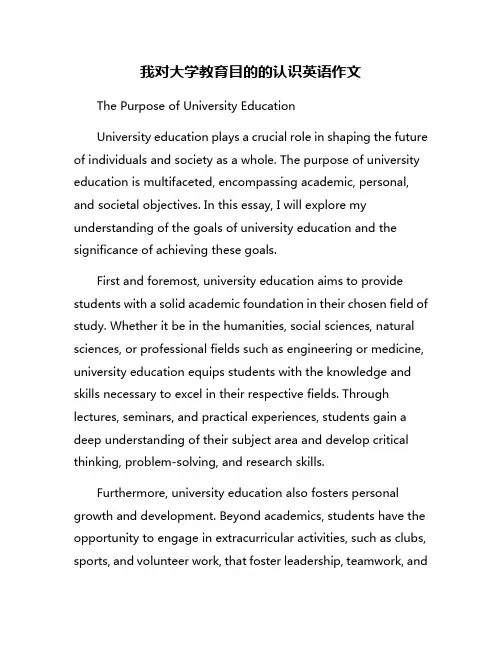
我对大学教育目的的认识英语作文The Purpose of University EducationUniversity education plays a crucial role in shaping the future of individuals and society as a whole. The purpose of university education is multifaceted, encompassing academic, personal, and societal objectives. In this essay, I will explore my understanding of the goals of university education and the significance of achieving these goals.First and foremost, university education aims to provide students with a solid academic foundation in their chosen field of study. Whether it be in the humanities, social sciences, natural sciences, or professional fields such as engineering or medicine, university education equips students with the knowledge and skills necessary to excel in their respective fields. Through lectures, seminars, and practical experiences, students gain a deep understanding of their subject area and develop critical thinking, problem-solving, and research skills.Furthermore, university education also fosters personal growth and development. Beyond academics, students have the opportunity to engage in extracurricular activities, such as clubs, sports, and volunteer work, that foster leadership, teamwork, andcommunication skills. University is a time for self-discovery and exploration, where students can discover their passions, interests, and values, and develop a sense of identity and purpose.Moreover, university education plays a crucial role in promoting societal progress and development. Universities are hubs of innovation, research, and knowledge creation that drive economic growth, technological advancement, and social change. Through research and collaboration with industry, government, and civil society, universities contribute to addressing pressing societal challenges, such as climate change, poverty, inequality, and healthcare. In addition, universities serve as engines of social mobility, providing opportunities for individuals from diverse backgrounds to access higher education and realize their full potential.In conclusion, the purpose of university education is to empower individuals with the knowledge, skills, and values to succeed in their chosen field, lead fulfilling lives, and contribute to the betterment of society. By achieving these goals, universities play a vital role in shaping the future of individuals and society, fostering a culture of lifelong learning, innovation, and social responsibility. As a student, I am committed to makingthe most of my university education and leveraging it to make a positive impact on the world.。
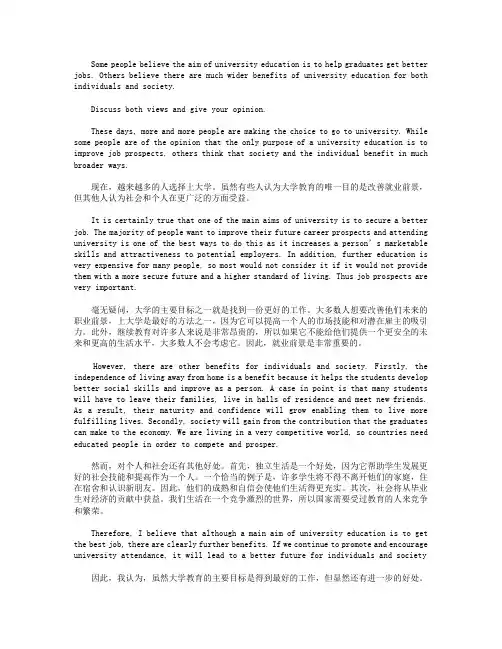
Some people believe the aim of university education is to help graduates get better jobs. Others believe there are much wider benefits of university education for both individuals and society.Discuss both views and give your opinion.These days, more and more people are making the choice to go to university. While some people are of the opinion that the only purpose of a university education is to improve job prospects, others think that society and the individual benefit in much broader ways.现在,越来越多的人选择上大学。
虽然有些人认为大学教育的唯一目的是改善就业前景,但其他人认为社会和个人在更广泛的方面受益。
It is certainly true that one of the main aims of university is to secure a better job. The majority of people want to improve their future career prospects and attending university is one of the best ways to do this as it increases a person’s marketable skills and attractiveness to potential employers. In addition, further education is very expensive for many people, so most would not consider it if it would not provide them with a more secure future and a higher standard of living. Thus job prospects are very important.毫无疑问,大学的主要目标之一就是找到一份更好的工作。
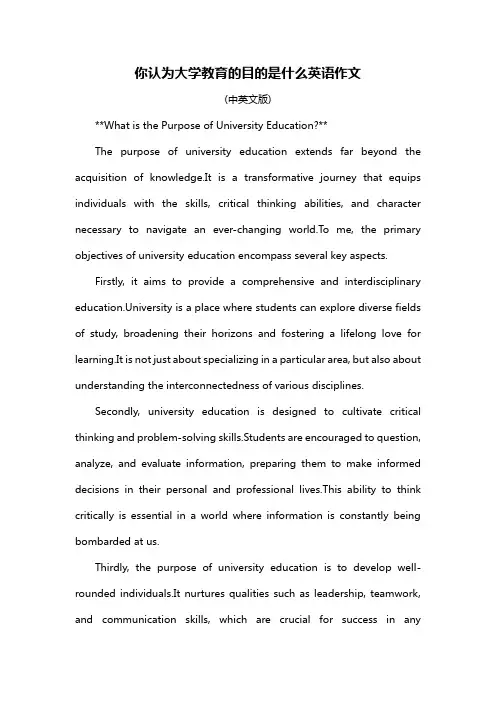
你认为大学教育的目的是什么英语作文(中英文版)**What is the Purpose of University Education?**The purpose of university education extends far beyond the acquisition of knowledge.It is a transformative journey that equips individuals with the skills, critical thinking abilities, and character necessary to navigate an ever-changing world.To me, the primary objectives of university education encompass several key aspects.Firstly, it aims to provide a comprehensive and interdisciplinary education.University is a place where students can explore diverse fields of study, broadening their horizons and fostering a lifelong love for learning.It is not just about specializing in a particular area, but also about understanding the interconnectedness of various disciplines.Secondly, university education is designed to cultivate critical thinking and problem-solving skills.Students are encouraged to question, analyze, and evaluate information, preparing them to make informed decisions in their personal and professional lives.This ability to think critically is essential in a world where information is constantly being bombarded at us.Thirdly, the purpose of university education is to develop well-rounded individuals.It nurtures qualities such as leadership, teamwork, and communication skills, which are crucial for success in anyfield.Universities also provide opportunities for students to engage in extracurricular activities, community service, and internships, which help in developing a well-rounded personality.Moreover, university education plays a significant role in fostering innovation and creativity.It encourages students to think outside the box, challenge existing ideas, and come up with innovative solutions to complex problems.This is especially important in today"s world, where innovation is a driving force for progress.Lastly, a university education should prepare students for their future careers.It provides them with the necessary qualifications, knowledge, and skills to excel in their chosen fields.But more importantly, it equips them with the adaptability and resilience required to navigate the ever-evolving job market.In conclusion, the purpose of university education is multifaceted.It goes beyond mere knowledge acquisition and focuses on developing well-rounded individuals who possess critical thinking abilities, innovation, and career preparedness.It is a journey of self-discovery, personal growth, and preparation for the challenges of the real world.**大学教育的目的是什么?**大学教育的目的远不止于知识的获取。
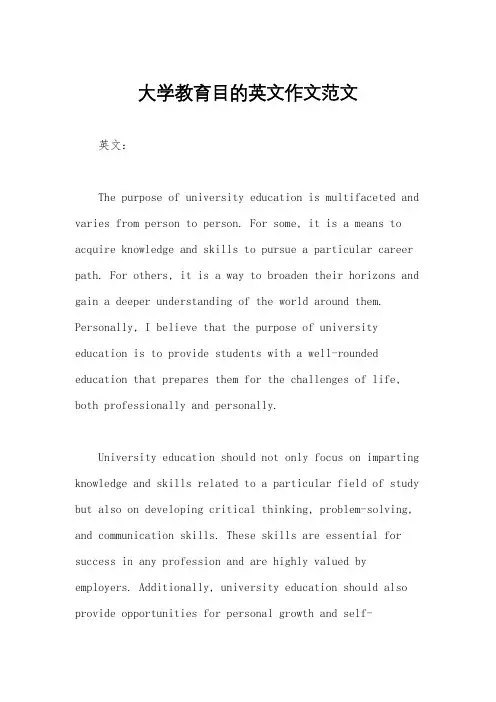
大学教育目的英文作文范文英文:The purpose of university education is multifaceted and varies from person to person. For some, it is a means to acquire knowledge and skills to pursue a particular career path. For others, it is a way to broaden their horizons and gain a deeper understanding of the world around them. Personally, I believe that the purpose of university education is to provide students with a well-rounded education that prepares them for the challenges of life, both professionally and personally.University education should not only focus on imparting knowledge and skills related to a particular field of study but also on developing critical thinking, problem-solving, and communication skills. These skills are essential for success in any profession and are highly valued by employers. Additionally, university education should also provide opportunities for personal growth and self-discovery. Students should be encouraged to explore their interests and passions through extracurricular activities and community service.Furthermore, university education should also foster a sense of social responsibility and global citizenship. Students should be exposed to diverse perspectives and cultures, and encouraged to engage in meaningful dialogue and collaboration with individuals from different backgrounds. This will help them develop empathy, respect, and a sense of responsibility towards the global community.In summary, the purpose of university education is to provide students with a well-rounded education that prepares them for the challenges of life, both professionally and personally. This includes developing critical thinking, problem-solving, communication skills, personal growth, and a sense of social responsibility and global citizenship.中文:大学教育的目的是多方面的,因人而异。
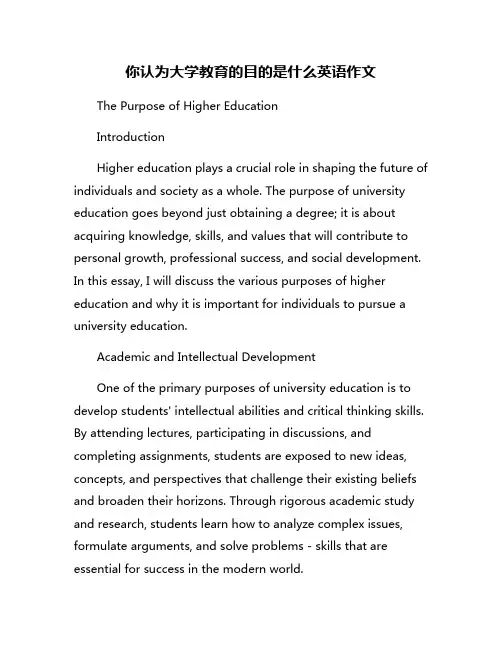
你认为大学教育的目的是什么英语作文The Purpose of Higher EducationIntroductionHigher education plays a crucial role in shaping the future of individuals and society as a whole. The purpose of university education goes beyond just obtaining a degree; it is about acquiring knowledge, skills, and values that will contribute to personal growth, professional success, and social development. In this essay, I will discuss the various purposes of higher education and why it is important for individuals to pursue a university education.Academic and Intellectual DevelopmentOne of the primary purposes of university education is to develop students' intellectual abilities and critical thinking skills. By attending lectures, participating in discussions, and completing assignments, students are exposed to new ideas, concepts, and perspectives that challenge their existing beliefs and broaden their horizons. Through rigorous academic study and research, students learn how to analyze complex issues, formulate arguments, and solve problems - skills that are essential for success in the modern world.Career PreparationAnother important purpose of higher education is to prepare students for the workforce. Universities offer a wide range of degree programs and courses that are designed to provide students with the knowledge and skills needed to succeed in their chosen careers. From business and engineering to social sciences and humanities, universities offer diverse curriculum options that allow students to pursue their passions and interests while gaining practical skills that are in high demand in the job market.Personal Growth and DevelopmentIn addition to academic and career-related goals, university education also plays a significant role in students' personal growth and development. By living on campus, interacting with diverse groups of peers, and participating in extracurricular activities, students have the opportunity to develop valuable life skills such as communication, teamwork, and leadership. University life also fosters independence, self-reliance, andself-discipline, qualities that are essential for success in both personal and professional life.Social ResponsibilityBeyond individual benefits, higher education also serves a larger societal purpose. Universities are hubs of knowledge and innovation that contribute to the advancement of society through research, scholarship, and community engagement. By educating the next generation of leaders, thinkers, and change-makers, universities play a critical role in shaping the future of society and addressing pressing global challenges such as climate change, poverty, and inequality. Through partnerships with local communities, governments, and businesses, universities can leverage their resources and expertise to create positive social impact and promote sustainable development.ConclusionIn conclusion, the purpose of higher education is multifaceted and complex. It is not only about obtaining a degree or securing a job, but also about acquiring knowledge, skills, and values that will enable individuals to lead fulfilling lives, contribute to the advancement of society, and make a positive impact on the world. By recognizing the diverse purposes of higher education and embracing the opportunities it offers, students can maximize their potential and realize their dreams. As we navigate the challenges and opportunities of the 21stcentury, the role of universities in shaping the future of individuals and society will be more important than ever.。
大学教育的英语作文在日常的学习、工作、生活中,大家都尝试过写作文吧,作文要求篇章结构完整,一定要避免无结尾作文的出现。
相信写作文是一个让许多人都头痛的问题,下面是店铺为大家收集的大学教育的英语作文,供大家参考借鉴,希望可以帮助到有需要的朋友。
大学教育的英语作文篇1Whether College Study Is Necessary?With the increasing number of college students every year, a number of people start to suspect that whether college study is necessary.As far as I am concerned, college study is necessary. There are reasons accounting for my point.随着高校毕业生数量每年的不断增加,很多人开始怀疑,上大学是否有必要。
就我而言,大学学习是必须的。
有几点可以支持我的观点。
First, college study is an effective way to improve ourselves. We are able to learn some major knowledge and improve our skills, which gives a basis for our future career. Second, college study is a bridge between school and society and it gives us a chance to get acquaintance with society in advance. For example, we need to learn how to get along with different kinds of people so that we can cooperate with others better. Last but not least, college study is helpful for us forming correct view on life and sense of value. Through college study, we are gradually developing the ability of thinking independently and forming our own model of thinking. And this process is definitely important for our future life and career.首先,大学学习是自我提高的有效途径。
大学教育的目标是什么大学教育的目标是培养全面发展的人才。
大学作为高等教育的最高阶段,其教育目标应该是提供高质量、广泛多样的教育资源,以促进学生个性的全面发展,并为他们未来的职业发展做好准备。
首先,大学教育的目标是帮助学生获得专业知识和技能。
通过开展各种学科的课程,大学教育为学生提供了广阔的知识领域,帮助他们建立起夯实的专业基础,并掌握相关的理论和实践技能。
这能为他们毕业后进入职业领域提供有效支持。
同时,助学生了解当前社会发展的趋势和需求,并通过各种实践活动,培养学生的创新思维和动手能力,以应对未来的挑战和变化。
其次,大学教育的目标是培养学生的综合素质。
大学作为一个社交和文化环境,除了提供专业知识外,还应通过开展各种社团、活动和比赛等,帮助学生培养领导力、团队合作、沟通能力和问题解决能力等综合素质。
此外,大学还要培养学生的创新能力和创业精神,这种精神将对学生整个职业生涯产生深远的影响。
再次,大学教育的目标是培养学生的人文精神和社会责任感。
大学教育是一个开放、多元的平台,应该教育学生具有国际化视野、公民意识和社会责任感,使他们成为具有辨识力和社会敏感性的人。
通过开展人文科学的课程,大学教育可以帮助学生了解人类文明的瑰宝,并培养他们的人文素养,以应对复杂的人际关系和社会问题。
最后,大学教育的目标是培养学生的持续学习能力和自我发展能力。
随着时代的发展,知识的更新速度越来越快,大学教育应致力于培养学生的终身学习能力,使他们能够不断适应变化的世界。
大学教育还应通过指导和培训,帮助学生了解自己的兴趣、优势和志向,并给予他们个体化的发展支持,让他们能够实现自我价值和追求个人梦想。
总之,大学教育的目标是培养全面发展的人才,即在专业知识、综合素质、人文精神和自我发展能力等方面进行全面发展,为学生的职业发展和个人发展奠定良好基础。
这不仅对学生个人具有重要意义,也对整个社会的进步和发展起到积极作用。
大学教育的目标大学教育的目标是培养学生全面发展的人才,具体包括以下几个方面。
首先,大学教育的目标是提供高质量的学术知识。
大学是一个知识的宝库,学生在这里能够接触到前沿的学术研究成果和知识体系。
大学应该通过不同科目的教学,向学生介绍各个学科的基本原理和理论,培养学生的学术素养和批判思维能力。
这样,学生可以通过学习获取到广泛的知识,为以后的职业发展打下坚实的基础。
其次,大学教育的目标是培养学生的实践能力。
大学不仅要教授学科知识,更应该注重培养学生的实践能力。
大学应该为学生提供各种实践机会,如实习、实验、社会实践等,让学生能够将所学的理论知识应用到实践中,提高解决问题的能力和创新能力。
这样,学生可以更好地适应社会的变化和发展。
再次,大学教育的目标是培养学生的综合素质。
大学不仅是一个学习的地方,更是一个人才培养的场所。
大学应该通过各种教育活动,如社团、志愿服务等,培养学生的组织能力、领导能力和团队合作能力,使学生具备良好的人际关系和沟通能力。
同时,大学也应该注重培养学生的道德品质和社会责任感,使他们成为有担当、有思考能力的人。
最后,大学教育的目标是培养学生的个人发展。
大学应该尊重学生的个性,鼓励学生发展自己的特长和兴趣。
大学应该提供各类课外活动和文化艺术活动,为学生提供展示才能和发展个性的机会。
大学也应该关注学生的身心健康,提供必要的健康教育和心理辅导,帮助学生建立正确的人生观和价值观。
综上所述,大学教育的目标是培养学生全面发展的人才。
大学应该提供高质量的学术知识,培养学生的实践能力,发展学生的综合素质,促进学生的个人发展。
只有这样,才能培养出具有创新精神、实践能力和社会责任感的优秀人才。
如何看待大学教育的目的英语作文The Purpose of University EducationUniversity education plays a crucial role in shaping individuals’ intellectual development, career prospects, and overall life satisfaction. However, the debate over the primary purpose of university education has been ongoing. Some argue that the main goal of university education is to prepare individuals for the workforce, while others believe that it should focus on personal growth, critical thinking, and lifelong learning.One of the main purposes of university education is to equip students with the knowledge and skills needed to pursue a successful career. In today’s competitive job market, a university degree is often a prerequisite for securing well-paying and fulfilling employment opportunities. Universities offer specialized programs and courses that provide students within-depth knowledge in their chosen fields of study. In addition to academic knowledge, universities also offer practical training and internships that allow students to gain real-world experience and develop essential workplace skills.Furthermore, university education plays a crucial role in fostering personal growth and critical thinking skills. Universitiesoffer a diverse range of courses that expose students to new ideas, perspectives, and ways of thinking. Through engaging with challenging coursework and participating in lively discussions, students develop their analytical andproblem-solving abilities. Moreover, universities provide students with opportunities for self-reflection, personal development, and building meaningful relationships with peers and mentors.Another key purpose of university education is to instill a love of learning and a commitment to lifelong learning. By encouraging students to explore new areas of knowledge, question established beliefs, and engage with complex issues, universities foster a spirit of intellectual curiosity and openness. The skills that students acquire in university, such as critical thinking, communication, and research abilities, are transferable to various contexts and are essential for lifelong success and personal fulfillment.In conclusion, the purpose of university education is multifaceted and encompasses both preparing students for the workforce and promoting personal growth and lifelong learning. By providing students with the knowledge, skills, and experiences needed to succeed in their chosen careers, universityeducation empowers individuals to achieve their full potential and make meaningful contributions to society. Ultimately, the value of university education lies in its ability to nourish the mind, broaden perspectives, and cultivate a lifelong passion for learning.。
The Aim of a University Education大学教育的目的If then a practical end must be assigned to a University course, I say it is that of training good members of society. Its art is the art of social life, and its end is fitness for the world.如果一定要赋予大学教育一个切实的目的,我的主张是培养社会的好公民。
大学教育的艺术就是社会生活的艺术,其目的就是使人适应这个世界。
It neither confines its views to particular professions on the one hand, nor creates heroes or inspires genius on the other. Works, indeed, of genius fall under no art; heroic minds come under no rule;大学教育一方面既不应把着眼点局限于某些特定的职业上,另一方面也不应是造就英雄,培养天才。
事实上,天才伟业无法人为造就,英雄的思想亦如天马行空。
A University is not a birthplace of poets or of immortal authors, of founders of schools, leaders of colonies, or conquerors of nations. It does not promise a generation of Aristotles or Newtons, of Napoleons or Washingtons, of Raphaels or Shakespeares, though such miracles of nature it has before now contained within its precincts.大学不是诗人、不朽作家和学派创立者的诞生地,也不是殖民地头领或外族征服者的培训所。
大学教育的目的作文英文$$The Purpose of University Education$$University education stands as a pivotal phase in the intellectual and personal growth of individuals. It is a transition from the structured learning environments of secondary school to the more independent and specialized academic pursuits of higher learning. The essence of university education lies not merely in the acquisition of knowledge or the attainment of a degree, but in the cultivation of critical thinking, innovation, and the ethical framework that shapes one's view of the world and one's place within it.Firstly, university education aims to broaden students' horizons and deepen their understanding of various disciplines. Through a diverse array of courses, students are exposed to a range of ideas, perspectives, and methodologies that challenge and enrich their pre-existing knowledge. This process of intellectual exploration not only enhances cognitive abilities but also encourages open-mindedness and tolerance for differing viewpoints. The interdisciplinary approach, which is increasinglyemphasized in modern universities, further fosterscreativity and innovation by encouraging students to think across traditional boundaries.Moreover, university education serves as a platform for personal growth and development. It is a time for studentsto explore their interests, passions, and values. Through participation in clubs, societies, volunteer work, andother extracurricular activities, students have the opportunity to develop leadership skills, teamworkabilities, and a sense of social responsibility. These experiences also help them to refine their identity,clarify their career goals, and prepare for the challengesof the workplace and society at large.Critical thinking is another core objective ofuniversity education. In contrast to the rote learningoften associated with secondary school, university courses demand a higher level of analytical and evaluative thinking. Students are encouraged to question assumptions, analyze complex issues from multiple perspectives, and formulate arguments supported by evidence. This process not only enhances problem-solving abilities but also cultivates amindset that is essential for informed citizenship and responsible decision-making in all areas of life.Furthermore, university education plays a vital role in preparing students for the future. The rapid pace of technological advancement and social change means that individuals need to be adaptable, resilient, and continuously learning. University courses, especially those in fields such as science, technology, engineering, and mathematics, provide the foundation for students to keep up with these developments and contribute to society in meaningful ways. Additionally, the skills and competencies acquired during university education, such as communication, collaboration, and adaptability, are increasingly valued by employers in today's competitive job market.Finally, university education is about more than just career preparation. It is also about fostering a sense of purpose and meaning in life. Through studying diverse subjects, engaging with different cultures and perspectives, and participating in meaningful extracurricular activities, students have the opportunity to develop a deeper understanding of themselves and their place in the world.This understanding can lead to a more fulfilling and meaningful life, one that is not solely focused on personal success but also contributes to the well-being of society and the planet.In conclusion, the purpose of university education is multifaceted and goes beyond the acquisition of knowledge or the attainment of a degree. It involves intellectual exploration, personal growth, the cultivation of critical thinking, preparation for the future, and the search for meaning and purpose in life. By providing a rich and diverse academic environment that encourages exploration, experimentation, and reflection, universities play acrucial role in shaping individuals who are not only well-prepared for the challenges of the modern world but also contribute positively to society and humanity at large.。
大学教育的目标The Goal of University Education
Nowadays most people go to university not only to learn new knowledge but to get a degree. Many of them no longer care about what they really learn in university, they care more about whether they will get the degree or not. They regard the degree as a golden key to a better jobs or higher salaries. For them, nothing is more important than a degree in university. In my point of view, I cannot agree to this idea.
现在大多数人上大学不是为了学习新的知识,而是为了要得到学位。
大多人都不再关心他们在大学真正学到什么,他们关心的是是否能得到学位。
他们把学位作为找到更好工作或获得更高薪水的金钥匙。
对他们来说,没有什么比大学学位更重要。
在我看来,我不同意这个观点。
In the first place, degree is nothing but a paper that can prove you have finished your courses. Most students don’t realize what helps them to find a good job is what they really learn from university, the professional course, and the social skills and so on. In addition, having certificates is more important than having a degree. For instance, if you are looking for a translation job, you certainly need a CET-4 or CET-6 certificate. if you want to be a high school
teacher, you need more certificate to prove yourself that you are fit for this job, such as TEM-8 and teacher certificate which is not a degree can show your abilities.
首先,学历只不过是一张证明你已经完成学业的纸而已。
大多数学生并没意识到真正能帮助他们找到一份好工作的是他们在大学里真正学到的东西,比如专业课,社会技能等。
此外,证书比学位证书更重要。
例如,如果您正在寻找一份翻译的工作,你一定需要一个大学英语四或六级的证书。
如果你想成为一名中学教师,你需要更多的证书来证明你自己适合这份工作,如英语专业八级证书和教师资格证书,这虽然不是学位却能显示你的能力。
In the second place, having a good personal relationship is much nicer than having a degree. In the social net, you have more friends means you have more choices. For example, many students do not choose the right major in university because their parents chose for them, so that they may not work hard. In that case, this kind of students should spend more time to learn what they are really interested in and make more friends. It’s much better than they spend the whole time to learn the major which they don’t like at all.
第二,有一个良好的人际关系比拥有学位要好得多。
在社交网站上,你拥有更多的朋友意味着你有更多的选择。
例如,许多
学生没有选择恰当的大学主要是因为他们的父母为他们做了选择,以至于他们可能不努力学习。
在这种情况下,这类学生应该花更多的时间去学习自己真正感兴趣的东西,交更多的朋友。
这样比他们把全部时间花在他们不感兴趣的专业上要好得多。
To sum up, students should not care too much about their degree, and they should focus on what is truly needed for their future life. The goal of university education is not just to get a degree, but the really useful knowledge and practical experience.
总之,学生不应该太在意他们的学历,他们应该关注他们未来生活真正需要的是什么。
大学教育的目标不仅仅是获得一个学位,而是真正实用的知识和实践经验。